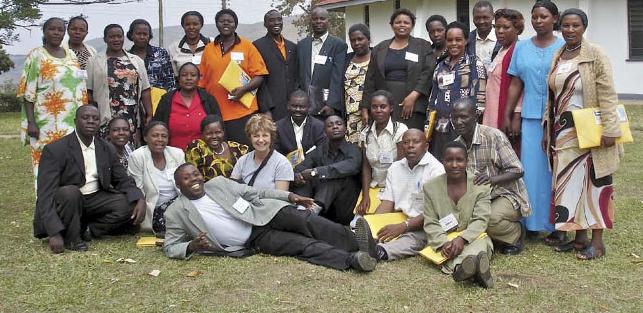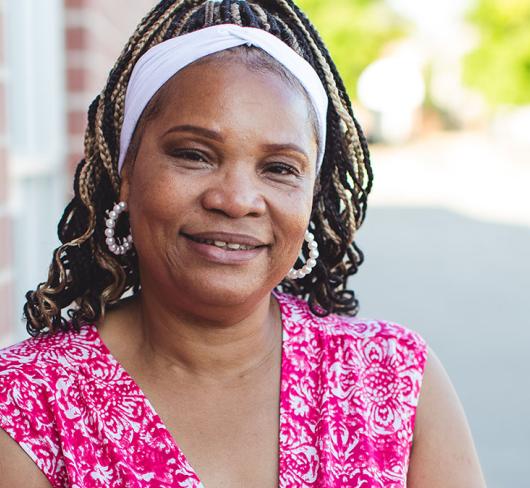
Project Overseas, Sharing Leadership Worldwide: Learning and Teaching in Uganda
My primary assignment as a Project Overseas participant in Uganda was to facilitate, with my Ugandan co-tutor, a series of workshops in early literacy for Ugandan teachers. I faced two challenges. How could I make the workshops relevant and practical, given the unique difficulties confronting Ugandan teachers? How could I make North American teaching styles and techniques work within their context?
My preparations included background research, consultation with former Project Overseas participants and early literacy specialists, and training provided by CTF. The team going to Uganda did considerable planning by email and teleconference. We also connected with Ugandan co-tutors by email to discuss the needs of participants, workshop ideas, and areas on which to focus.
Understanding local challenges
Despite all this we were not prepared for the extreme poverty and the difficult situations Ugandans face. Soon after arriving, we discovered an elementary school in a sad state of disrepair. Slogans like “Sex can wait” and “Respect yourself” were painted on narrow pieces of wood nailed to trees. We concluded the school had been abandoned for some time. Imagine our surprise to find a teacher sitting in a corner of one of the rooms, marking exercise books. We struck up a conversation, and had the first of many lessons on the reality of teaching in rural Uganda. We learned, for instance, that the slogans were part of a campaign mandated by the country’s president and were meant to discourage sexual activity, because there is such a high incidence of HIV-AIDS. Disease, HIV-AIDS, malnutrition, and conflict contribute to making Uganda, with a median age of 14, the country with the world’s youngest population.
Visiting schools provided a valuable context to help us understand what teachers deal with every day. Up to 80 students were crowded into one classroom, sitting on benches at narrow tables. Worn blackboards, cracked and difficult to write on, were the main instructional tool. Often the only resources in sight were some faded handmade posters on the walls. On the plus side, the teachers had better classroom management than many Canadian classes I have visited. The students were attentive, respectful, focused, and hard-working. Ugandans place a high value on education. We were constantly amazed at the positive spirit and resilience of the people we met, both in and out of the school setting.
Addressing a wide range of needs
It was soon evident that among the teachers in my early literacy class there was a considerable range in the level of training, experience, and grades taught (Primary 1 to teachers college). My Ugandan co-tutor, Sam Gasta is an educator at one of the teachers colleges and his knowledge was a valuable resource in addressing the participants' needs. Each day he and I spent time debriefing and planning, and we successfully melded his more traditional teaching techniques with my methods, balancing theory with practical, hands-on activities and strategies.
Many strategies we take for granted were new to our Ugandan colleagues; for instance, the many different ways to use a morning message on the board. We incorporated poetry, music – an integral part of their lives – and drama into a variety of teaching strategies. We demonstrated how one book could be used for various teaching points. We capitalized on the teachers’ considerable skills and experiences, and they regularly shared what worked for them in their classrooms. Teachers wrote in their reflection journals daily, giving us insight into what resonated with them and what other areas we needed to address.
Accessing local resources
Gaining access to new information and methods is difficult in Uganda. Halfway through the workshop, we found the official Uganda Primary School Curriculum in a local bookstore. It was a valuable tool to help teachers create programming that uses the thematic approach that the government and the Uganda National Teachers’ Union (UNATU) are currently promoting across the country. The teachers were eager to learn and share ways of implementing this approach in their classrooms.
Whenever possible we used natural or found local materials. For example, in the mathematics class, stones, bottle caps, and dried beans were used as counters. Base 10 blocks were cut out of discarded cardboard. Teachers in the workshop on co-operative learning structures were excited to see how they could use small-group activities to engage children. These activities were reinforced and extended in the different subject area workshops as well. The workshop on AIDS awareness was an eye-opener for everyone: we were shocked at the misconceptions about AIDS, and our team leader and a UNATU executive member arranged for a doctor to provide accurate information.
UNATU is very young, only five years old, and is experiencing a steep learning curve. For instance, on the first day of the workshop that UNATU organized, many teachers were worried that they wouldn’t be compensated because details like transportation expenses had not yet been finalized. They were also worried that they would contract malaria in the mosquito infested dorms. Fortunately, UNATU was able to resolve these issues quickly. It was clear from the discussion at our final debriefing session that the union had learned an important lesson about workshop organization.
Project Overseas is an excellent way of promoting greater understanding and goodwill among teachers. Teachers in developing countries gain knowledge of effective and innovative teaching strategies and methods. They become more aware of the value and structure of their unions. Local unions improve their organizational skills.
Teaching in Uganda was hard work at times, but it was a most gratifying and joyful experience. I am humbled by my Ugandan colleagues’ enthusiasm, dedication, and appreciation for what they have. They inspire me to be a better teacher and a better person. I’m continuing my connection with Uganda in various ways, including participation in GuluWalk in Toronto, which helps raise money and awareness for the people in northern Uganda.
I would like to thank ETFO and CTF for enabling my participation. I would also like to thank the Toronto Occasional Teacher Local, the Elementary Teachers of Toronto Status of Women Committee, family, friends, and colleagues who donated money and supplies for me to distribute to schools in Uganda. The donations were greatly appreciated by all the participants.

